Unconventional #17: Trump meets the man who could become his running mate
1. The Trump Veepwatch, Vol. 3: Bob Corker
In which Unconventional examines the presumptive Republican nominee’s possible — and not-so-possible — vice-presidential picks. Previous installments: Newt Gingrich, Jan Brewer.
Name: Robert Phillips “Bob” Corker Jr.
Age: 63
Resume: U.S. senator from Tennessee and former mayor of Chattanooga
Source of speculation: Unlike, say, Marco Rubio or John Kasich, Corker had never really been touted as a top Trump veep pick.
But earlier this month, Politico’s Mike Allen — a clearinghouse for inside-the-Beltway hype, dope and speculation — suddenly reported that “Republican insiders are buzzing about Sen. Bob Corker (R-Tenn.), chair of Senate Foreign Relations, as an attractive, plausible vice-presidential pick for Trump.”
Allen then produced a pair of anonymous quotes as proof of Corker’s buzzworthiness.
“He’s an independent guy — kind of a tough guy — who’s not afraid to swim upstream,” said a “Republican who knows Corker well.” “He’s frustrated by being in the Senate and not getting anything done. I think he’d really lean into this. He’s not afraid to buck the old guard. And he’s no dummy: He jumped out on the Trump thing early.”
“Corker is not well-liked by his colleagues in the Senate,” said another “Great Mentioner.” “A big reason is he likes to get stuff done with Democrats. Trump might find that attractive.”
Allen’s item pretty much did it. For the next couple of weeks, the buzz around Corker only got buzzier, with various outlets jumping on the Corker-for-VP bandwagon and conservative pundit Charles Krauthammer openly betting that Corker would wind up on the ticket.
“He has a bit of gravitas,” Krauthammer swooned.
Meanwhile, Trump seems to have taken the hint. On Friday, Robert Costa of the Washington post reported that Corker “is scheduled to meet Monday with the presumptive GOP presidential nominee, according to two people close to the Trump campaign.”
Now it’s Monday, and Corker is on his way to Trump Tower.
We wonder what the senator and the Donald will be talking about.
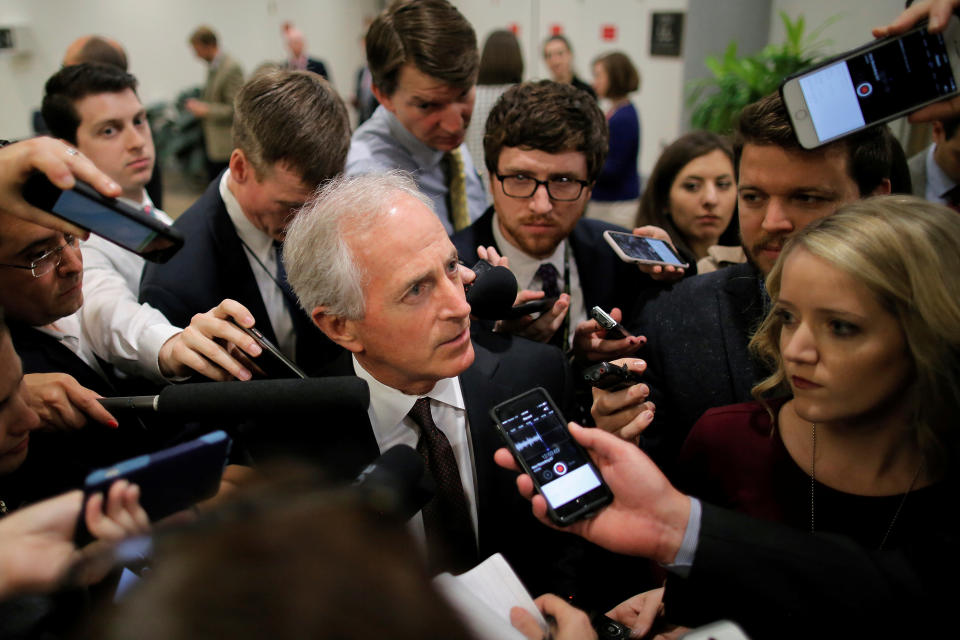
Backstory: During the primaries, Corker repeatedly refused to endorse any of this year’s many Republican candidates.
“I’m giving no advice,” Corker said the day before Tennessee’s March 1 primary, breaking ranks with fellow Tennessee Republicans Sen. Lamar Alexander and Gov. Bill Haslam, both of whom backed Rubio. “I didn’t feel like me endorsing is the right thing to do.”
Yet unlike most of the rest of his Senate colleagues, Corker signaled early on that he was open to Trump. Shortly after Trump clobbered Ted Cruz by a whopping 14 percentage points in Tennessee, Corker released a terse statement condemning Republican pols for rallying around the #StopTrump banner.
“Here’s my message to the Republican Party leaders: Focus more on listening to the American people and less on trying to stifle their voice,” Corker said. “What’s happening in the Republican primary is the result of two things: the fecklessness and ineptness of the Washington establishment in failing to address the big issues facing our country and years of anger with the overreach of the Obama administration. And to be candid, I think the American people should be angrier than they are.”
As Trump solidified his standing at the front of the GOP pack over the next couple of months, Corker continued to warm to him.
In late April, Corker surprised many Washington observers by praising Trump’s big foreign policy speech as a “really good transition in the campaign” and commending Trump for “challenging the foreign policy establishment that has been here for so long”; in the same interview, Corker called Cruz’s efforts to force a contested convention “inappropriate,” claiming he was “repulsed by those who try to direct the electoral process in a certain direction and say, ‘Well, no matter what people do, we’re going to cause this to happen at the convention.’”
Trump called Corker that week.
A few days later, Corker offered to help Trump develop his foreign-policy platform, likening the presumptive nominee to an earlier generation of conservative realists.
“Look, the foreign policy establishment in the last 15 or 16 years hasn’t gotten things exactly right,” Corker told USA Today. “What I hear in what [Trump is] saying . . . is more of a George H.W. Bush view of the world. I hear him embracing more of a James Baker view of the world, and a larger degree of realism is making its way into his thinking, and I very much appreciate that.”
According to Costa’s report, Trump “deeply appreciated the effusive support from Corker, especially at a time when others in the party were sharply critical.” Corker went on to have “a series of phone calls” with chief Trump strategist Paul Manafort, while Corker’s office supplied “information to the campaign.”
Corker even instructed his party’s many Trump haters “just to chill” and accept the candidate’s inevitable coronation.
“A coming together [is] taking place,” he said.
When asked directly whether Trump is grooming him for the running-mate gig — and whether he would say yes if asked — Corker tends to play coy.
“I have no reason to believe I’m being considered for any position right now, and you have absolutely no control over it,” Corker told Nashville’s News Channel 5. “Certainly I would say running for it is actually a negative thing to do.”
Which is what someone would say if they were interested.
Odds: As good as they can be. Corker clearly likes Trump — or the opportunity for political advancement that Trump represents — and the feeling seems to be mutual: so far, Corker is the only senator Trump has summoned to his headquarters in New York.
When asked which qualities he’s looking for in a running mate, Trump always says the same thing: that he’s giving special weight to political experience; that he wants a vice president who can help him “with legislation” and “getting things through” Washington; that he’s mostly considering established politicians who have “been vetted over the last 20 years.”
Sounds a lot like Corker. During his 15-year career in politics — first as mayor of Chattanooga, then as Tennessee’s junior senator — Corker has established a reputation as a committed conservative who nonetheless likes to get things done, often defying the GOP’s hell-no caucus to negotiate with the other side. Since arriving on Capitol Hill in 2007, Corker has doggedly worked to broker compromises on several major issues, including financial reform, the federal debt, immigration and Iran. The Christian Science Monitor once called him “the Senate GOP’s tireless dealmaker”; Politico agreed, explaining that “beneath the sharp tongue and air of disdain toward Washington is a man who believes in making a deal.”
Remind you of anyone?
Like the author of The Art of the Deal, Corker — one of the Senate’s wealthiest members — honed his dealmaking instincts as a construction and real estate entrepreneur before entering the political fray. He even shares Trump’s penchant for bluntness:
[Corker] has chided the Senate for acting immature and described senators during a policy debate as “a bunch of midgets.” He questioned the “silly” bailout of automakers; he described a proposal from Sen. John McCain to suspend the federal gas tax as “pandering extraordinaire”; and, during the 2013 government shutdown, he berated Sen. Ted Cruz on the Senate floor. Corker says he thought about quitting Congress midway through his first term because he was fed up with not being able to get much done. So often has he insulted fellow senators, it almost sounds believable.
Trump and Corker have a lot in common, and what they don’t have in common —Corker’s Washington experience and foreign policy expertise — only makes the senator a more compelling pick for Trump. On paper, the pairing makes perfect sense. The question now is whether there’s any chemistry between them. It’s a question they may be answering up on the 25th floor of Trump Tower as we speak.
_____
2. Trump says he’s expanded the GOP. The numbers disagree.
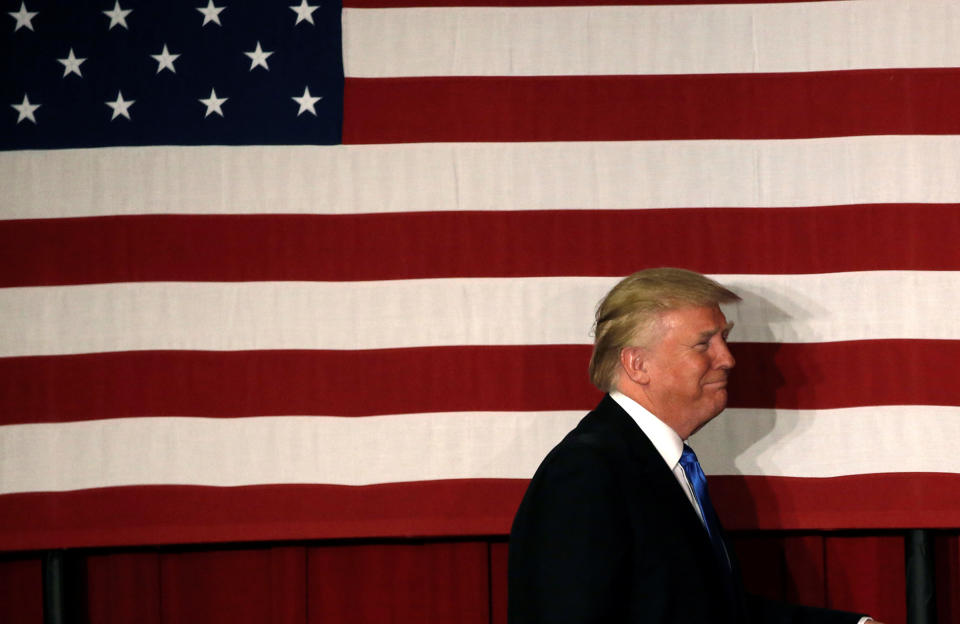
If anything about this summer’s Republican convention in Cleveland is certain, it’s that you can expect Donald Trump to boast about luring new voters to the GOP.
Meanwhile, pundits are likely to predict that Trump could overcome the Democrats’ growing demographic advantage in key swing states — states where white voters are no longer dominant majorities — by continuing to attract nontraditional voters, many from the white working class, to the polls for the first time in their lives.
But none of it is supported by the data — at least not yet.
According to Yahoo News Senior Political Correspondent Jon Ward, new numbers from the GOP primary show that increased turnout in several primary states was driven largely by already active Republican voters who have historically skipped primaries and voted only in general elections.
Ward reports:
The data so far indicate that Trump has not yet significantly grown the Republican Party. There are small numbers of new voters who came to the polls this year, and in one state — New Hampshire — that might be enough to help Trump win. But in several other swing states — Virginia, Ohio and Michigan — if the Democrats can reassemble the Obama coalition, Trump’s new support is not enough to win.
Optimus, the data and analytics firm that worked for Florida Sen. Marco Rubio, focused its analysis on a few key states.
In Virginia, there was a stunning turnout in the Republican primary on March 1. More than three times the number of primary voters in 2012 came to the polls – a total of 1,025,452.
Of that total, 18.6 percent, or 190,734, were regular primary voters. But they were swamped by voters who usually participate only in general elections. That group made up 72.1 percent of the Republican primary electorate in Virginia. Younger voters who weren’t eligible for previous elections and those who moved into the state made up 3.6 percent.
Only 5.7 percent of the more than 1 million primary voters were new voters. That’s a total of 58,450 new voters.
To put that in perspective, look at the 2012 general election. In 2012 in Virginia, President Obama defeated Republican nominee Mitt Romney by almost 150,000 votes. Obama received 1,971,820 votes to Romney’s 1,822,522.
So if you add the nearly 60,000 votes to a Republican nominee, but the Democrat re-creates Obama’s turnout — which, again, is not a sure thing — then the Republican is still 90,000 votes short.
And keep in mind that the Virginia primary was one of the most closely contested in the GOP race. Trump won the state, but with only one-third of the vote. He got 356,840 votes but Rubio, Texas Sen. Ted Cruz, Ohio Gov. John Kasich and retired neurosurgeon Ben Carson received a combined 657,080 votes.
Many of those Republican voters will turn out for Trump against Clinton, even if they opposed him in the primary. But some won’t.
To go further, Optimus looked at the results of almost 4,000 telephone surveys it did around the time of the primary. Using those responses, it built a model of the Virginia electorate and found that of the 72 percent of voters who were new to the primary but usually voted in the general election, “the vast majority” were voters who were likely to support a Republican candidate already.
This confirmed that the “new” primary voters were almost all regular Republican voters who usually cast ballots only in a general election in the fall. They are not first-time voters or traditionally Democratic-leaning individuals who crossed over.
The same dynamic surfaced in Ohio and Michigan. Only in New Hampshire did the 0ptimus data suggest that Trump might win where Romney lost. But as Ward notes, “flipping New Hampshire into the Republican column would not be nearly enough to win the 270 Electoral College votes required to secure the presidency.”
Make sure to read the rest here.
_____
3. Pro-Sanders and anti-Trump protesters plan to take to the streets in Philly and Cleveland
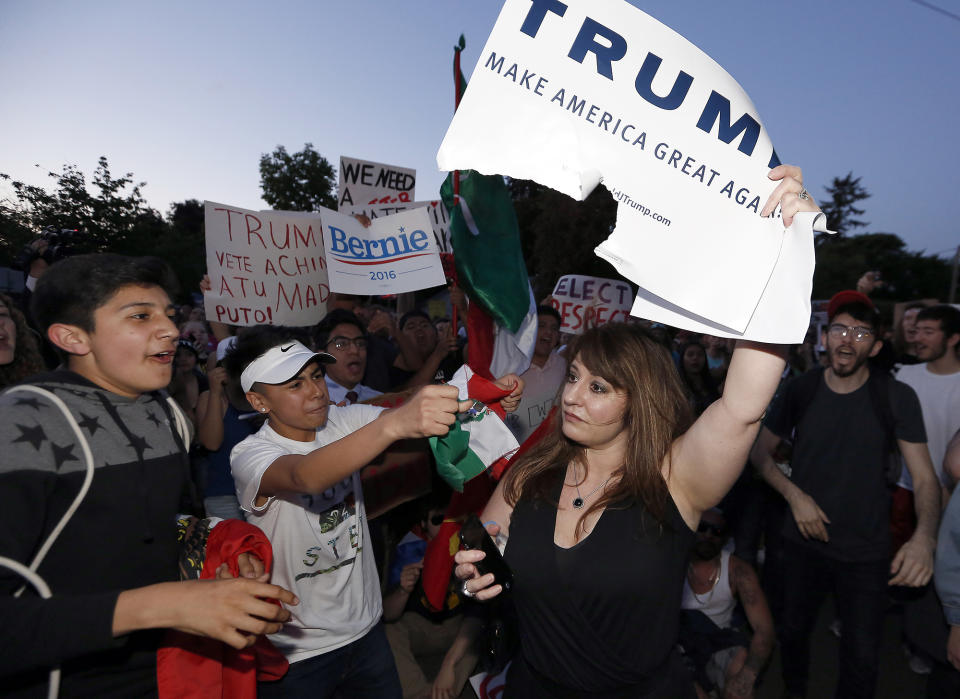
Balloons. Confetti. Red, white and blue. And lots of standard-issue speeches by lots of standard-issue politicians.
What goes on inside the hall at the Republican and Democratic conventions tends to be fairly predictable; it’s unlikely that even Donald Trump, he of marble, mirrors and gold-plated everything, will be able to stray too far from the script.
But outside, on the streets, anything can happen.
That’s especially true in a year like 2016. This summer’s conventions may not be contested, but they will certainly be conflicted, with deep divisions over the ideological direction of the parties and passionate opposition to the presumptive nominees.
The protests are already taking shape.
In Philadelphia — the birthplace of the First Amendment — nine groups have applied to the city for protest permits. The first to get the go-ahead was the “March for a Clean Energy Revolution,” which will consist of an estimated 5,000 climate-change activists trooping from City Hall to Independence Mall on July 24, the day before the convention formally begins. Applications from the American Dream Project (a melting ice sculpture of the words “The American Dream” by two Brooklyn artists) and Global Zero’s “Race to Zero” (a no-nukes demonstration) are awaiting approval as well.
But the vast majority of Philly protests won’t be so, shall we say, polite. That’s because at least four of them, and possibly a fifth, will be organized by explicitly pro-Bernie Sanders groups — which means that they will be protesting Hillary Clinton’s likely nomination.
Last week, the city granted permits to three smaller pro-Sanders demonstrations — think 2,000 to 3,000 attendees apiece — set to take place at Thomas Paine Plaza, few miles from the Wells Fargo Center. (Sponsoring groups include Black Men for Bernie and the Equality Coalition for Bernie Sanders.)
The more combustible event, however, will be the massive March for Bernie, which will overtake FDR Park — prime real estate right next to the convention site, in full view of delegates and journalists — for four straight days, from July 24 to July 28. Organizers expect 30,000 people to walk from Washington, D.C., to Philadelphia and camp out in the park for the duration of the convention; one of them, Karen Chamberlain, recently told the Philadelphia Daily News that she wants everyone to gather at the Liberty Bell to form a human peace sign before embarking on a final “Let Freedom Ring” march toward the Wells Fargo Center.
“We want maybe a million bells ringing as we approach the DNC to wake up the nation to the corruption that is going on in our country,” Chamberlain said.
In other words, don’t expect Sanders supporters to stay quiet in Philly.
The protest lineup for Cleveland is murkier. So far, at least eight groups have requested protest permits for the Republican convention; in total, the applications estimate more than 40,000 participants, 100 horses, more than 100 cars and other vehicles and, in the case of a group opposed to nuclear proliferation, one 48-foot inflatable rocket.
The problem is that the city hasn’t approved any of the permits yet. For weeks, in fact, Cleveland ignored written and verbal public records requests from journalists for copies of permit applications, failing to produce a single document or acknowledge receiving any new applications until publicly called out by Cleveland.com columnist Mark Naymik last Thursday.
Now that some info has been released — the city caved the day after Naymik’s column came out — at least one thing is clear: many of the protesters in Cleveland will be protesting Trump. Stand Together Against Trump — a group of local physicians and other young professionals outraged by Trump’s “rhetoric against women and minorities” — wants to hold a 10,000-person demonstration in downtown Cleveland during the final day of the GOP convention. The Coalition to March on the RNC and Dump Trump plans to protest in Public Square before marching to Quicken Loans Arena and back on the first day of the convention — with or without a permit. And the People’s Fightback Center / March Against Racism, which is led by Cleveland activist Susan Schnur, intends to call attention to what it describes as the “police murder” of innocent black men, including Cleveland’s own Tamir Rice.
One pro-Trump organization has applied for a permit as well; according to Cleveland.com, the group is coordinating with Bikers for Trump and Truckers for Trump and expects more than 5,000 marchers, 104 cars and trucks, 100 horses and four motorcycles.
It may be awhile, however, before a final picture of the Cleveland protests emerges. The city has said that it does not plan to rule on protest permits or release “parade routes” until the U.S. Secret Service establishes a security perimeter around Quicken Loans Arena, which may not happen until two or three weeks before the convention begins on July 18 — a delay that the ACLU of Ohio has described as unacceptable.
“Delays by the city are effectively blocking groups from exercising their fundamental right to political expression,” ACLU of Ohio Executive Director Christine Link said in a written news release threatening to sue the city if it doesn’t act by June 1. “Cleveland is using security planning as a mask to suppress political speech. The city’s decision to allow such long delays is creating unacceptable barriers for potential demonstrators, regardless of political affiliation.”
_____
4. #NeverTrump? Never gonna happen! (Vol. 2) — or, now even Lindsey Graham is reportedly telling Republicans to support Donald Trump
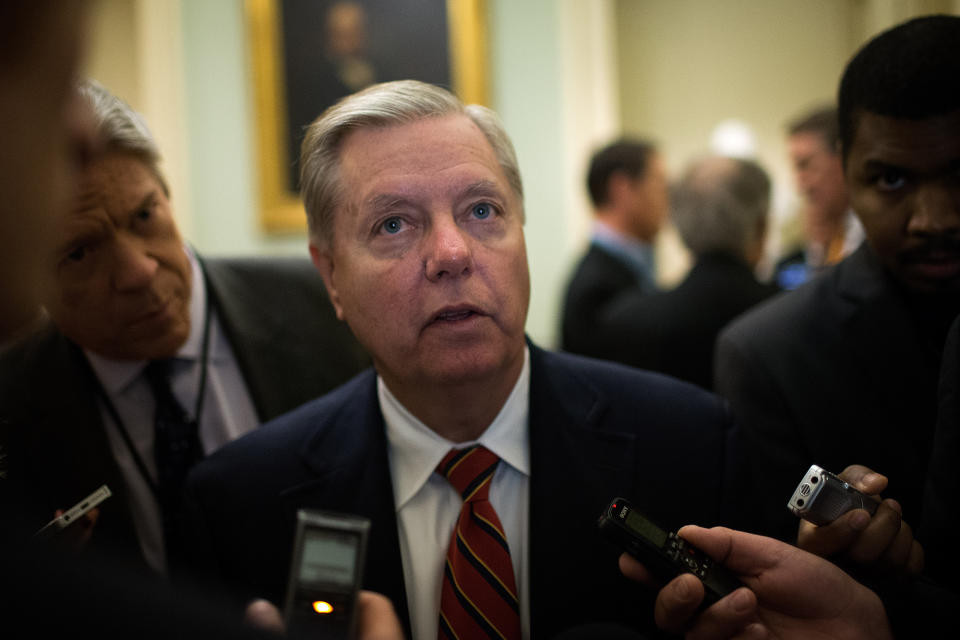
An occasional Unconventional series exploring the latest news about the ongoing shadow “convention” to nominate a conservative #NeverTrump candidate — and why the effort is doomed to fail.
By Dylan Stableford
“He’s a race-baiting, xenophobic, religious bigot.”
“He doesn’t represent my party. He doesn’t represent the values that the men and women who wear the uniform are fighting for.”
“I’d rather lose without Donald Trump than try to win with him. I wish he would leave the party. I don’t care if he runs as an independent. If we lose the 2016 election, so be it.”
“You know how you make America great again? Tell Donald Trump to go to hell.”
That was Lindsey Graham back in December. At the time, Trump was also firing off scathing attacks against Graham, then one of his rivals in the race for the GOP nomination. But it appears the South Carolina senator is suddenly softening his tone on the presumptive Republican nominee.
(Read the full version of this story here.)
On Friday, Graham told CNN he spoke with Trump and they had “a good conversation.”
“I must say he reached out, number one,” Graham said. “And I was glad to talk to him.”
And Saturday, Graham reportedly urged donors at a private GOP fundraiser in Florida to unite behind the real estate mogul and former “Celebrity Apprentice” star to keep the Republican Party intact — and Hillary Clinton away from the White House.
“He did say that we need to get behind him,” Teresa Dailey, who attended the event, told CNN on Sunday.
According to Dailey, Graham told attendees that he has no plans to formally endorse Trump.
So what made him change his tone?
Graham, a ranking member of the Senate Armed Services Committee, told CNN on Friday that Trump “asked really good questions” during their conversation.
“I think he’s reconsidering a little bit about what to do in Syria,” he said. “I don’t know if Hillary Clinton — what will Hillary Clinton do different than President Obama? President Obama has no strategy to destroy ISIL.”
_____

The best of the rest
What does it mean that @markos @joshtpm & @kdrum are taking shots at Bernie? My answer in @POLITICOMag: https://t.co/IhNJILckLU
— Bill Scher (@billscher) May 23, 2016
Sanders delegates are bracing for a convention fight https://t.co/fhDJum98K1 w @catherine_lucey
— Nick Riccardi (@NickRiccardi) May 20, 2016
NEW: @LindseyGrahamSC privately urges GOP donors to support @realDonaldTrump https://t.co/J6iRAeLFwd
— Jeremy Diamond (@JDiamond1) May 22, 2016
Cruz's campaign is over, but his delegates fight on https://t.co/P8gSQwJ7XN
— Seema Mehta (@LATSeema) May 21, 2016
Clinton, Sanders duel over Latino vote in California (from @AP) https://t.co/kpCWwZ1jWU
— Michael R. Blood (@MichaelRBloodAP) May 22, 2016
A group of the GOP's top 50 donors told @alexburnsNYT and I they will not give a dime to Trump. Here's why > https://t.co/Z2dFPuSqJn
— Jonathan Martin (@jmartNYT) May 22, 2016
Will Ohio Republicans who worked for Kasich help Trump in the state? "They would be shot," says @JWGOP https://t.co/5M55OApomy
— Reid J. Epstein (@reidepstein) May 22, 2016
Washington GOP convention awards 40 of 41 delegates to Cruz over Trump https://t.co/9bzMhoUU7F pic.twitter.com/29iroGlquH
— The Hill (@thehill) May 22, 2016
_____
History lesson
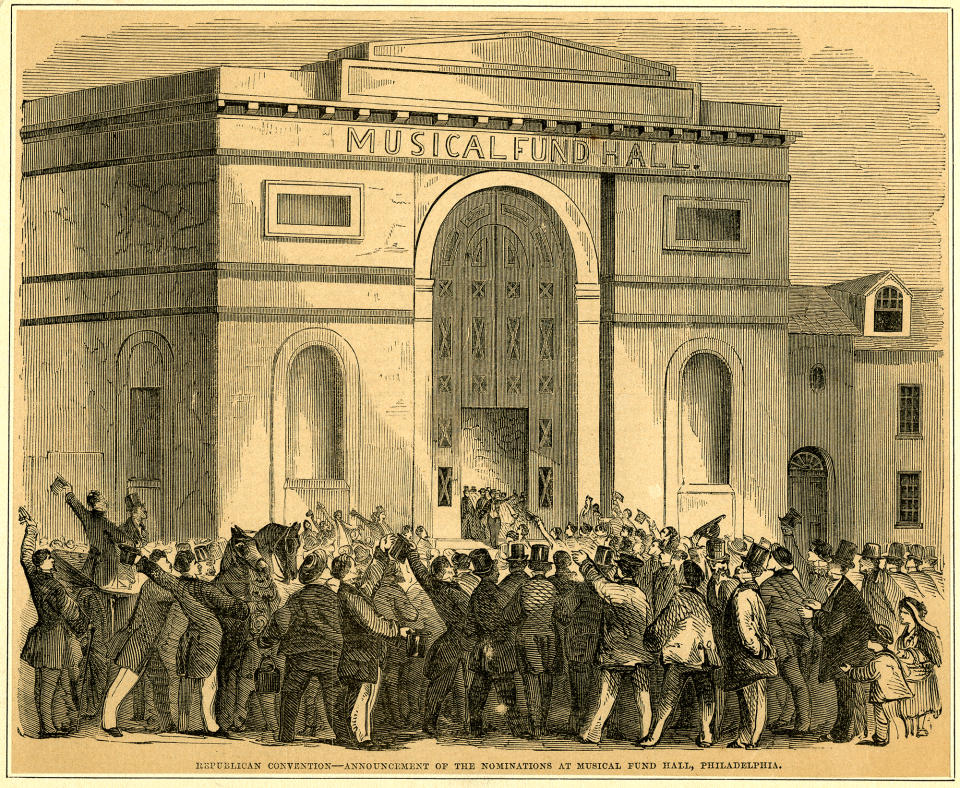
To all of this year’s failed presidential — and vice-presidential — candidates: if at first you don’t succeed, there’s always next election cycle.
At the inaugural Republican convention — held June 17-19, 1856, in Philadelphia — a Pennsylvania delegate named John Allison nominated for VP a man he described as “a good fellow, a firm friend of freedom and an old line Whig.”
(Before it became the GOP, the Republican Party, formed in 1854 to oppose the extension of the “peculiar institution,” was a hodgepodge of Whigs, abolitionists, Free-Soilers and anti-slavery Democrats.)
He’s “as pure a patriot who ever lived,” added Illinois delegate William B. Archer, seconding the nomination.
“Can he fight?” asked Rufus P. Spaulding of Ohio.
“Yes!” Archer replied. “Have I told you he was born in Kentucky? He’s strong mentally; he’s strong physically. He’s strong every way.”
Unfortunately — or fortunately, depending on how you look at it — the Illinois movement got underway too late, after most delegates were already committed to other candidates; their man lost, 253 to 110, to former Sen. William L. Dayton on New Jersey on an informal ballot, and his name was subsequently withdrawn.
Still, the “good fellow” from Illinois was flattered when news of his near-nomination later reached him.
“I reckon that ain’t me,” he said. “There’s another great man in Massachusetts named Lincoln” — he was likely referring to former Bay State Governor and Congressman Levi Lincoln Jr. — “and I reckon it’s him.”
Abraham Lincoln was, of course, wrong about that. Four years later, he would be president.
_____
Countdown
For the latest data, make sure to check the Yahoo News delegate scorecard and primary calendar.



